High bars of predecessors for high marches of successors
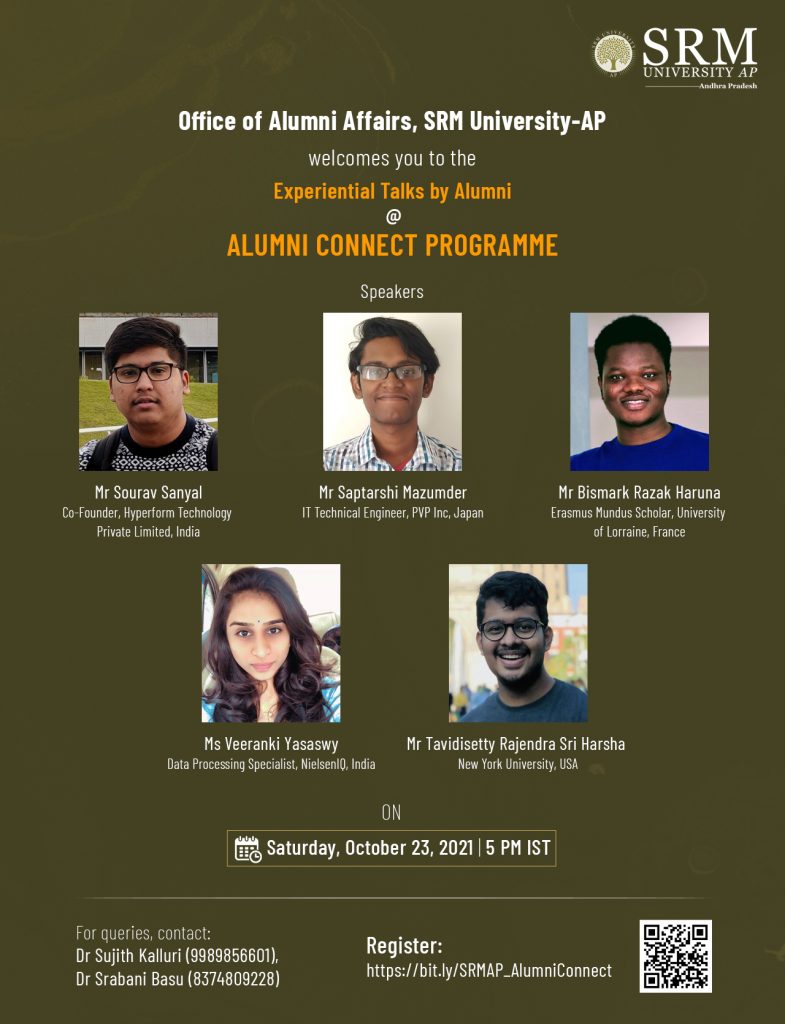 We bid adieu to the maiden batch with interesting placements and higher education opportunities in hand. Their farewell was as glorious as it was tearful. On October 23, 2021, SRM University-AP welcomed them back with the intention to aid the current students. In a colourful online ceremony, President Dr P Sathyanarayanan inaugurated the Alumni Connect Programme to help our students stay connected, even after graduation.
We bid adieu to the maiden batch with interesting placements and higher education opportunities in hand. Their farewell was as glorious as it was tearful. On October 23, 2021, SRM University-AP welcomed them back with the intention to aid the current students. In a colourful online ceremony, President Dr P Sathyanarayanan inaugurated the Alumni Connect Programme to help our students stay connected, even after graduation.
In his inaugural speech, Dr P Sathyanarayanan congratulated the graduate students for the rigorous years of studies and the many laurels that they have brought to their alma mater. He further expressed his beliefs that this kind of networking programme will bring the students closer and skillfully aid the existing students in their search for the best jobs, higher studies and other opportunities. “The founding batch has set the bar so high that the following batches will need to strive really hard to make their mark,” asserted Dr Sathyanarayan.
The event progressed with messages from Prof V S Rao, Vice-Chancellor, SRM University-AP and Prof D Narayana Rao, Pro-Vice-Chancellor, SRM University-AP. The eminent dignitaries launched the Alumni Yearbook-2021.
The event sprang to life with the jovial conversations between the alumni and the current students. The current students shared their fears and anxiety with their seniors, while our alumni shared their journey.
Listening to the alumni helped the current students be more confident and focused. The insights shared by the seniors helped the juniors plan their the academic and career trajectories more adequately.
The alumni also reminisced about their time at the University. They guided the current students on making the best use of all the state-of-the-art facilities that the University offers. In addition to that, they taught their juniors about managing academic studies and other activities without compromising with all the fun of college life.
The vigorous event came to an end with the facilitation ceremony by Ms Revathi B, Assistant Director, Student Affairs. Dr Sujith Kalluri, Assistant Director, Alumni Affairs, offered a concluding speech to mark the closing of the event.
- Published in News
Fully automated quality control of rigid and affine registrations of T1w and T2w MRI in Big Data using Machine Learning
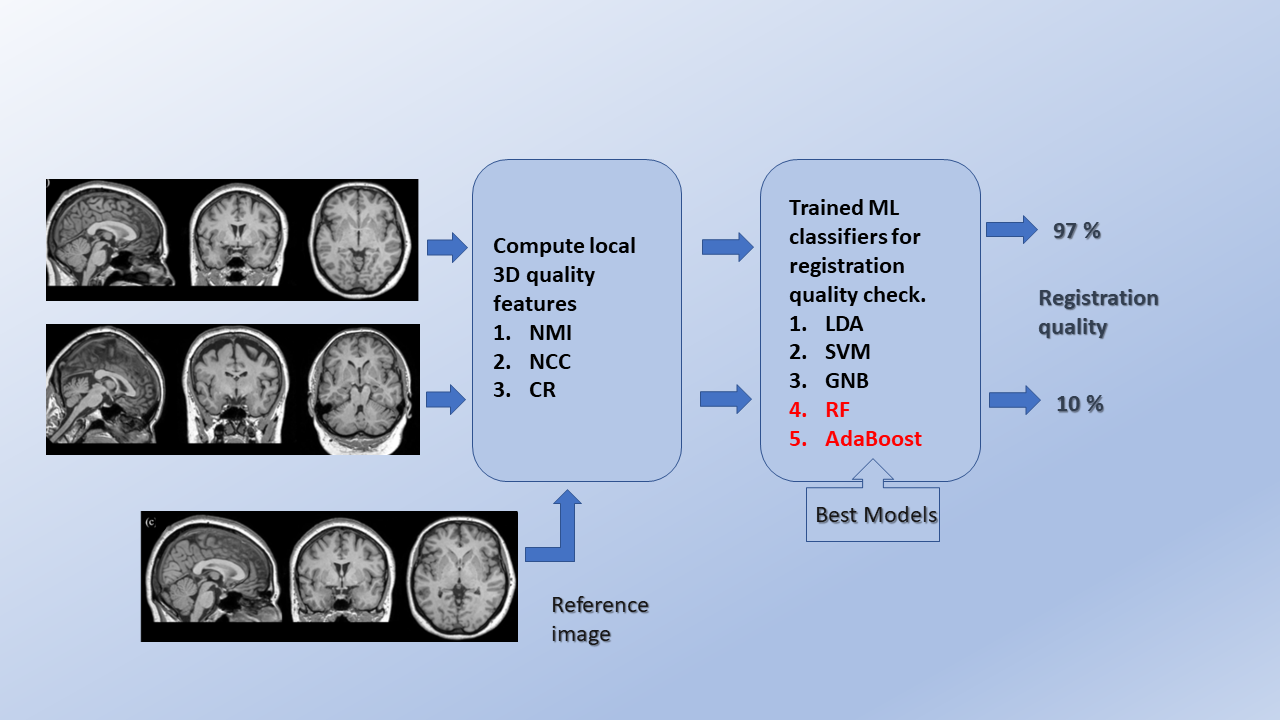 “Research is seeing what everybody else has seen and thinking what nobody else has thought.”
“Research is seeing what everybody else has seen and thinking what nobody else has thought.”
– Albert Szent-Györgyi
“Fully Automated Quality Control of Rigid and Affine Registrations of T1w and T2w MRI in Big Data using Machine Learning” is the latest research paper published by Dr Sudhakar Tummala, Assistant Professor, Electronics and Communication Engineering, SRM University-AP in ‘Computers in Biology and Medicine Journal’ having an Impact Factor of 4.6.
Abstract of the paper:
Background: Magnetic resonance imaging (MRI)-based morphometry and relaxometry are proven methods for the structural assessment of the human brain in several neurological disorders. These procedures are generally based on T1-weighted (T1w) and/or T2-weighted (T2w) MRI scans, and rigid and affine registrations to a standard template(s) are essential steps in such studies. Therefore, a fully automatic quality control (QC) of these registrations is necessary for big data scenarios to ensure that they are suitable for subsequent processing.
Method: A supervised machine learning (ML) framework is proposed by computing similarity metrics such as normalized cross-correlation, normalized mutual information, and correlation ratio locally. We have used these as candidate features for cross-validation and testing of different ML classifiers. For 5-fold repeated stratified grid search cross-validation, 400 correctly aligned, 2000 randomly generated misaligned images were used from the human connectome project young adult (HCP-YA) dataset. To test the cross-validated models, the datasets from autism brain imaging data exchange (ABIDE I) and information eXtraction from images (IXI) were used.
Results: The ensemble classifiers, random forest, and AdaBoost yielded the best performance with F1 scores, balanced accuracies, and Matthews correlation coefficients in the range of 0.95-1.00 during cross-validation. The predictive accuracies reached 0.99 on Test set #1 (ABIDE I), 0.99 without and 0.96 with noise on Test set #2 (IXI, stratified w.r.t scanner vendor and field strength).
Conclusions: The cross-validated and tested ML models could be used for QC of both T1w and T2w rigid and affine registrations in large-scale MRI studies.
Medical imaging is basically a method to see inside the body non-invasively. Magnetic resonance imaging (MRI) is one of the medical imaging modalities to see inside the body. MRI works on the principles of nuclear magnetic resonance. T1-weighted (T1w) and T2-weighted (T2w) MRI can enable us to see the brain without opening the skull and to monitor brain structural changes that occur in several medical and neurological conditions. It is important to monitor these structural changes over time to understand the disease progression. For example, in Alzheimer’s disease, it is important to monitor the hippocampus (memory storage centre) Recently, due to the advances in computational power such as high-performance GPUs and the availability of publicly accessible big data MRI, scientists around the world now conducting big data research studies. In group-based big data studies, for fair comparison of the brain between healthy and diseased individuals, it is necessary that the brain MRI images are registered to a common coordinate system. Therefore, quality control (QC) of these registrations is necessary to ensure that they are suitable for further processing. Further, in big data studies that involve several thousands of images, manual QC is not feasible and hence there is a need for a fully automated QC mechanism at the pre-processing stage. Checking the quality of rigid and affine registrations is one such task.
The research group implemented a fully automated QC mechanism based on computing several quality metrics local to the image and trained several machine learning classifiers based on these locally computed quality measures. The trained classifiers include linear discriminant analysis, support vector machine, Gaussian naïve Bayes, random forest and adaptive boosting. The developed ML models generalize well to detect misaligned registrations across different MRI scanner vendors and field strengths and even under noisy image situations. Therefore, the classifiers could be employed in big data studies for fully automated QC of registrations, especially T1w and T2w MRI.
Big data MRI studies are generally conducted using a large number of subjects. The conclusions drawn based on big data analysis are more reliable and help to understand the disease mechanics better. The developed method can help to reduce the manual labour for various QC mechanisms required during the pre-processing stage.
This work is done in collaboration with
a. Prof Erik B Dam, Machine Learning Group, University of Copenhagen, Copenhagen, Denmark.
b. Prof Niels K Focke, Clinic for neurology, University Medical Centre, Göttingen, Germany.
In future, the idea is to implement the QC framework using sparse autoencoders in an unsupervised manner and also using Siamese neural networks via deep representation learning.
- Published in Departmental News, ECE NEWS, News, Research News
Dr VK Saraswat inaugurated Centres of Excellence to promote translational research
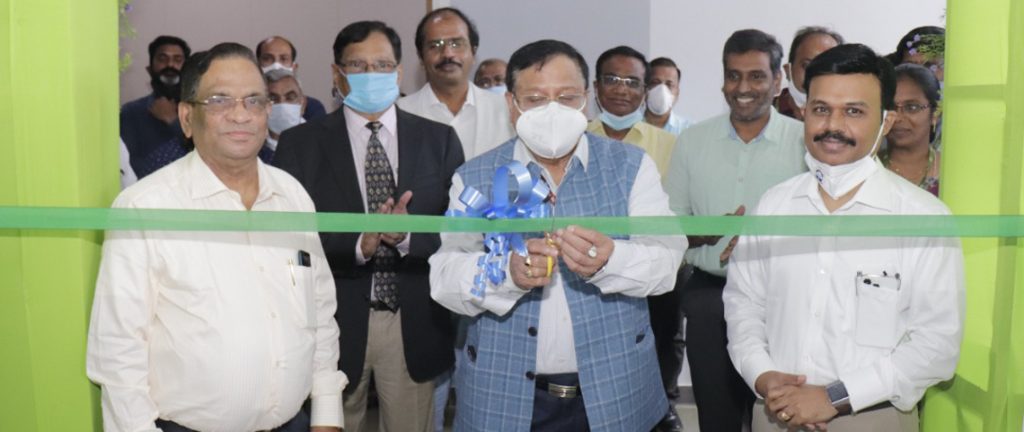 SRM University-AP organised its University Research Advisory Council Meeting on Monday, November 08, 2021. Dr V K Saraswat, Hon’ble Member, NITI AAYOG, chaired the meeting as the Chairman of the Council. Dr P Sathyanarayanan, President, SRM University-AP, Prof VS Rao, Vice-Chancellor, SRM University-AP, Prof D Narayana Rao, Pro-Vice-Chancellor, SRM University-AP, Dr Vinayak Kalluri, Registrar-in-Charge were among other dignitaries.
SRM University-AP organised its University Research Advisory Council Meeting on Monday, November 08, 2021. Dr V K Saraswat, Hon’ble Member, NITI AAYOG, chaired the meeting as the Chairman of the Council. Dr P Sathyanarayanan, President, SRM University-AP, Prof VS Rao, Vice-Chancellor, SRM University-AP, Prof D Narayana Rao, Pro-Vice-Chancellor, SRM University-AP, Dr Vinayak Kalluri, Registrar-in-Charge were among other dignitaries.
In his keynote speech, Dr V K Saraswat congratulated SRM University-AP for their remarkable progress as a university in the past two years. As a nascent university, SRMAP has already made its reputation as a progressive research university of the new era with numerous laurels to its credit. “India is going through a pedagogical shift in terms of policy and implementation. National Education Policy-2020 has sagaciously replaced the age-old redundant policy of 1968. It feels wonderful to note that SRM University-AP is already following NEP-2020 and its recommendations. NEP-2020 has provided extraordinary possibilities and opportunities to make the best use of human and natural resources in terms of education and research. NEP-2020 focuses on making India self-reliant as a nation. Hence NEP-2020 is to create job providers, no more job seekers”, said Dr Saraswat.
The suggestions and recommendations of NEP-2020 are curated to facilitate innovation and brilliance. The universities and educational institutions that are the cores of knowledge creation and dissemination are trusted with this responsibility of creating the leaders of tomorrow. In the twenty-first century, the focus should be on translational research of multidisciplinary nature. Industry-Academic relationships are needs of the hour. Dr Saraswat further proposed to develop Value Addition Centre in SRM University-AP to promote translational research. The centre will be strengthening the relationship between Industry and Academia to work on product engineering to deliver market relevant products. “Upscaling and upskilling are substantial in product engineering. We should further be focused on linking our curriculum to India’s glorious heritage. Our ancestors made tremendous progress in science, medicine, astrology, astronomy and other branches that the outside world knows very little about. It is now time to remember them and learn from them,” opined Dr Saraswat.
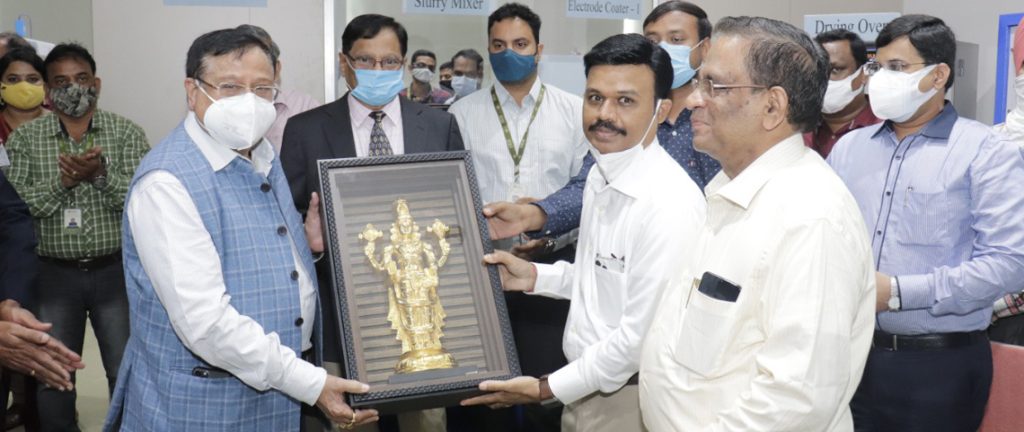 For any country that aspires to be among the best globally, knowledge generation should be given importance. For a country like India, with a population of 130 crores, unemployability is a curse. Following the recommendations of NEP-2020, focus should be put on Vocational Courses. It is vital that the students of this generation are aware of the science of engineering rather than science and engineering. Science of Engineering leads to the generation of knowledge, research with meaningful publications and recognition. Dr Saraswat further pointed out that liberal arts are an essential factor for holistic personality development in students.
For any country that aspires to be among the best globally, knowledge generation should be given importance. For a country like India, with a population of 130 crores, unemployability is a curse. Following the recommendations of NEP-2020, focus should be put on Vocational Courses. It is vital that the students of this generation are aware of the science of engineering rather than science and engineering. Science of Engineering leads to the generation of knowledge, research with meaningful publications and recognition. Dr Saraswat further pointed out that liberal arts are an essential factor for holistic personality development in students.
India has an ambitious plan to make the country carbon neutral by the year 2070. Thus, encouragement is given on environment-friendly research. Thrust is given on the green environment, energy efficiency, alternate and unconventional sources of energy, use of renewable resources and recycle of industrial waste among others. Research should be cost-effective and environment friendly. The focus should be on reducing the carbon footprint in nature with proper planning on the use-storage and distribution of hydrogen in nature. India produces many academicians, scientists and engineers every year, but today India is more about theoretical research. It is now time not only to write papers but also to produce designs that are market relevant. SRMAP should take the initiative in this regard to deliver India able designer-engineers.
Dr V K Saraswat inaugurated two Centres of Excellence that SRM University-AP has recently established to promote translational research. SRM Amara Raja Centre for Energy Storage Devices is set up, in collaboration with Amara Raja Batteries Limited- Tirupati, with a commitment to application-oriented research in the renewable energy and e-mobility. Centre for pioneering studies in Gold & Silver will be working on flagship project with Titan Company Ltd (TANISHQ) to develop novel gold alloy for contemporary jewellery design. The centre also aims to work on projects in collaboration with Waman Hari Pethe & Sons, Mumbai and other jewellery manufacturers across India to produce high strength 22 Karat gold and develop tarnish free silver alloys.
Dr P Sathyanarayanan, President, SRM University-AP, shared his vision to make SRM University-AP as a new-age world-class research university. He agreed with Dr Saraswat and asserted that the management of SRMAP is ready to provide every help needed. “SRMAP encourages deep industry engagements, entrepreneurship along with technological education and advancement. To provide holistic education to students, SRMAP provides a strong emphasis on liberal arts,” said Dr Sathyanarayanan. Prof VS Rao, Vice-Chancellor, SRM University-AP, further elaborated on the extensive plan that SRMAP has to build a world-class university in the heart of Andhra Pradesh. The university has collaborative lineage with reputed names in education to provide best education to the students.
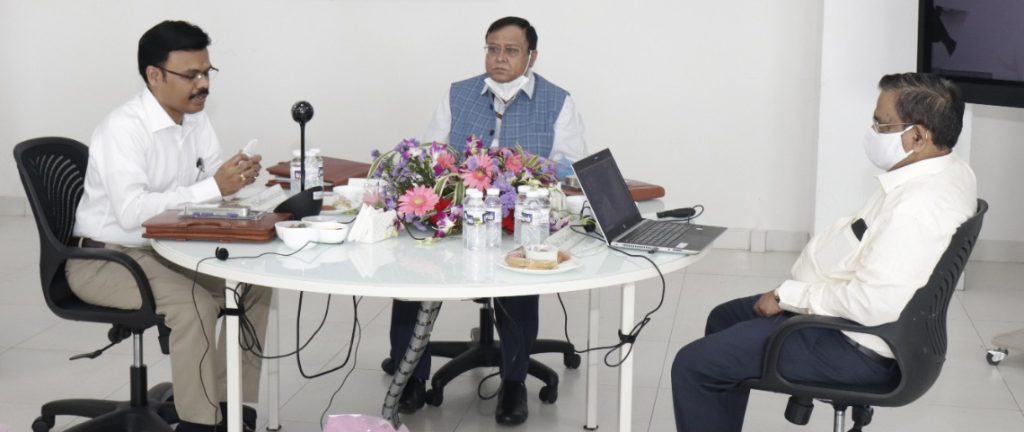 Prof D Narayana Rao, Pro-Vice-Chancellor, presented an overall roadmap of SRMAP’s progress in research so far and the way forward. The nascent university proudly houses 4500 students and 180 faculty with a few foreign nationals among them. Several DST- Inspire, DBT-Wellcome, Ramalingaswami and Ramanujan faculty are crowning the university with their exceptional research and teaching abilities. Stanford Research recognises the faculty of SRM University-AP among the world’s top 2% researchers. The university has published 678 papers in Scopus Indexed journals. The faculty are working on 38 projects with an outlay of 19.17 crores funded by the Government of India and Industry Giants.
Prof D Narayana Rao, Pro-Vice-Chancellor, presented an overall roadmap of SRMAP’s progress in research so far and the way forward. The nascent university proudly houses 4500 students and 180 faculty with a few foreign nationals among them. Several DST- Inspire, DBT-Wellcome, Ramalingaswami and Ramanujan faculty are crowning the university with their exceptional research and teaching abilities. Stanford Research recognises the faculty of SRM University-AP among the world’s top 2% researchers. The university has published 678 papers in Scopus Indexed journals. The faculty are working on 38 projects with an outlay of 19.17 crores funded by the Government of India and Industry Giants.
The committee agreed that fundamental areas cannot be compromised while working on the challenges in the education sector. Good students and faculty are to be attracted in order to pursue qualitative research. High end teaching and research facilities are essential for higher studies organisations. In initial years, collaborations can be beneficial for networking and promoting qualitative deliverables. The committee advocated for design schools to promote brainstorming for qualitative research. Every institution should have 4 fundamental pillars of education-teaching, research, industry-academia relation, societal benefits. Teaching and research should go hand-in-hand. The weakness of the institutions todays is undergrads are not given enough exposure to the practical knowledge of equipment. Critical thinking among students along with project-based teaching are to be encouraged from the initial years of the undergraduate studies.
Prof B S Murthy, Director, IIT-Hyderabad, Dr K Satyanarayana, Director, IIT-Tirupati, Dr S Chandra Sekhar, Director, CSIR-IICT, Hyderabad, Dr Mahendra Dev, Director & Vice Chancellor, Indira Gandhi Institute of Development Research, Mumbai, Prof M R Rao, Former Dean, Indian School of Business Hyderabad, Dr Tata Narasinga Rao, Director, International Advanced Research Centre for Powder Metallurgy & New Materials (ARCI), Hyderabad, Prof P Appa Rao, Former Vice Chancellor, University of Hyderabad, Dr K Varaprasada Reddy, Chairman Emeritus, Shantha Biotech Ltd Hyderabad, Dr S R Rao, Vice President, Sri Balaji Vidyapeeth Puducherry, Prof B P Sinha, ISI-Kolkata, Prof G P Das, Senior Professor, Indian Association for the Cultivation of Science, Kolkata, Prof R Balasubramanian, The Institute of Mathematical Sciences Taramani, Chennai, Prof U B Desai, Chancellor, Anurag University, Hyderabad, Prof B V R Chowdari, Nanyang Technological University Singapore, Prof Kamanio Chattopadhyay, IISc, Bangalore also participated in the meeting.
- Published in News, Research News
Design and implementation of frequency controller for wind energy-based hybrid power system
 Dr Tarkeshwar Mahto, Assistant Professor, in the Department of Electrical and Electronics Engineering has published a paper titled “Design and Implementation of Frequency Controller for Wind Energy-Based Hybrid Power System Using Quasi-Oppositional Harmonic Search Algorithm” in the reputed research journal, Energies.
Dr Tarkeshwar Mahto, Assistant Professor, in the Department of Electrical and Electronics Engineering has published a paper titled “Design and Implementation of Frequency Controller for Wind Energy-Based Hybrid Power System Using Quasi-Oppositional Harmonic Search Algorithm” in the reputed research journal, Energies.
An innovative union of fuzzy controller and proportional-integral-derivative (PID) controller under the environment of fractional order (FO) calculus is described in the present study for an isolated hybrid power system (IHPS) in the context of load frequency control. The proposed controller is designated as FO-fuzzy PID (FO-F-PID) controller. The undertaken model of IHPS presented here involves different independent power-producing units, a wind energy-based generator, a diesel engine-based generator and a device for energy storage (such as a superconducting magnetic energy storage system). The selection of the system and controller gains was achieved through a unique quasi-oppositional harmony search (QOHS) algorithm. The QOHS algorithm is based on the basic harmony search (HS) algorithm, in which the combined concept of quasi-opposition initialization and HS algorithm fastens the profile of convergence for the algorithm. The competency and potency of the intended FO-F-PID controller were verified by comparing its performance with three different controllers (integer-order (IO)-fuzzy-PID (IO-F-PID) controller, FO-PID and IO-PID controller) in terms of deviation in frequency and power under distinct perturbations in load demand conditions. The obtained simulation results validate the cutting-edge functioning of the projected FO-F-PID controller over the IO-F-PID, FO-PID and IO-PID controllers under non-linear and linear functioning conditions. In addition, the intended FO-F-PID controller, considered a hybrid model, proved to be more robust against the mismatches in loading and the non-linearity in the form of rate constraint under the deviation in frequency and power front.
The research group believes that the study will boost the use of renewable energy utilization for fulfilling energy requirements in a more reliable and stable manner. In future, they plan to use the knowledge gained from the isolated systems to develop a Multi-Migrigrid system.
Collaborations:
- Department of Electrical and Electronics Engineering, M S Ramaiah Institute of Technology, Bengaluru 560054, India
- The Berkeley Education Alliance for Research in Singapore, The National University of Singapore, Singapore 138602, Singapore
- Clean and Resilient Energy Systems (CARES) Lab, Texas A&M University, Galveston, TX 77553, USA;
- Department of Electrical Engineering, College of Engineering, Taif University, Taif 21944, Saudi Arabia
- Published in Departmental News, EEE NEWS, News, Research News






















